Transitioning Experiences of New RNs in a Dynamic Healthcare System
VerifiedAdded on 2023/06/05
|12
|3562
|222
Report
AI Summary
This report examines the experiences of new graduate registered nurses as they transition into clinical practice within the dynamic Australian healthcare environment. It highlights the challenges faced by novice nurses, such as high workloads, bullying, and the need to merge theoretical knowledge with practical application. The report also discusses the opportunities for learning and professional development during this transition period. It emphasizes the importance of healthcare organizations implementing effective transitioning strategies, including mentorship programs, supportive environments, and novice-friendly performance appraisals, to facilitate a smooth transition and improve nurse retention. The paper concludes by suggesting that novice nurses should leverage their personal strengths, such as emotional intelligence and problem-solving skills, to navigate the challenges of the ever-changing healthcare system.
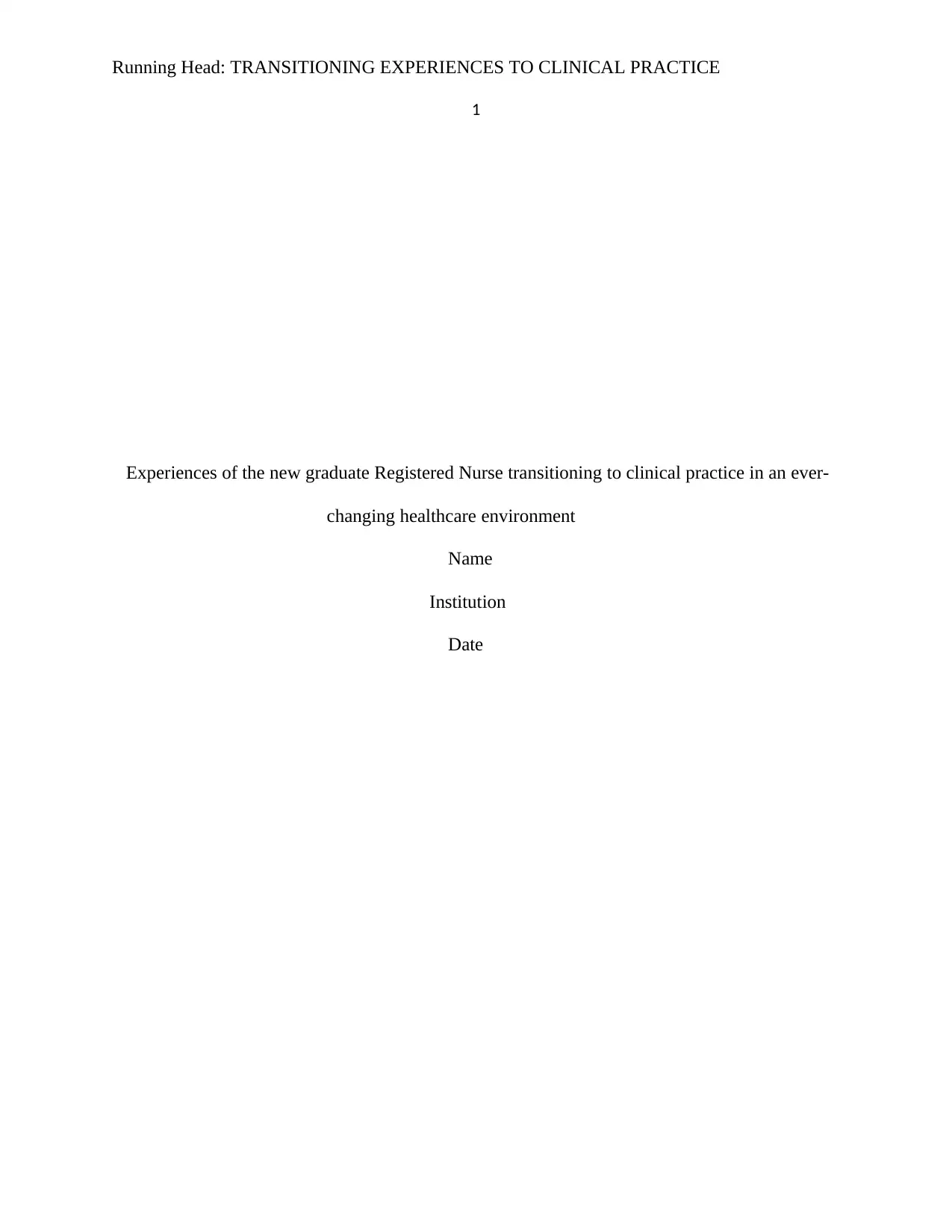
Running Head: TRANSITIONING EXPERIENCES TO CLINICAL PRACTICE
1
Experiences of the new graduate Registered Nurse transitioning to clinical practice in an ever-
changing healthcare environment
Name
Institution
Date
1
Experiences of the new graduate Registered Nurse transitioning to clinical practice in an ever-
changing healthcare environment
Name
Institution
Date
Paraphrase This Document
Need a fresh take? Get an instant paraphrase of this document with our AI Paraphraser
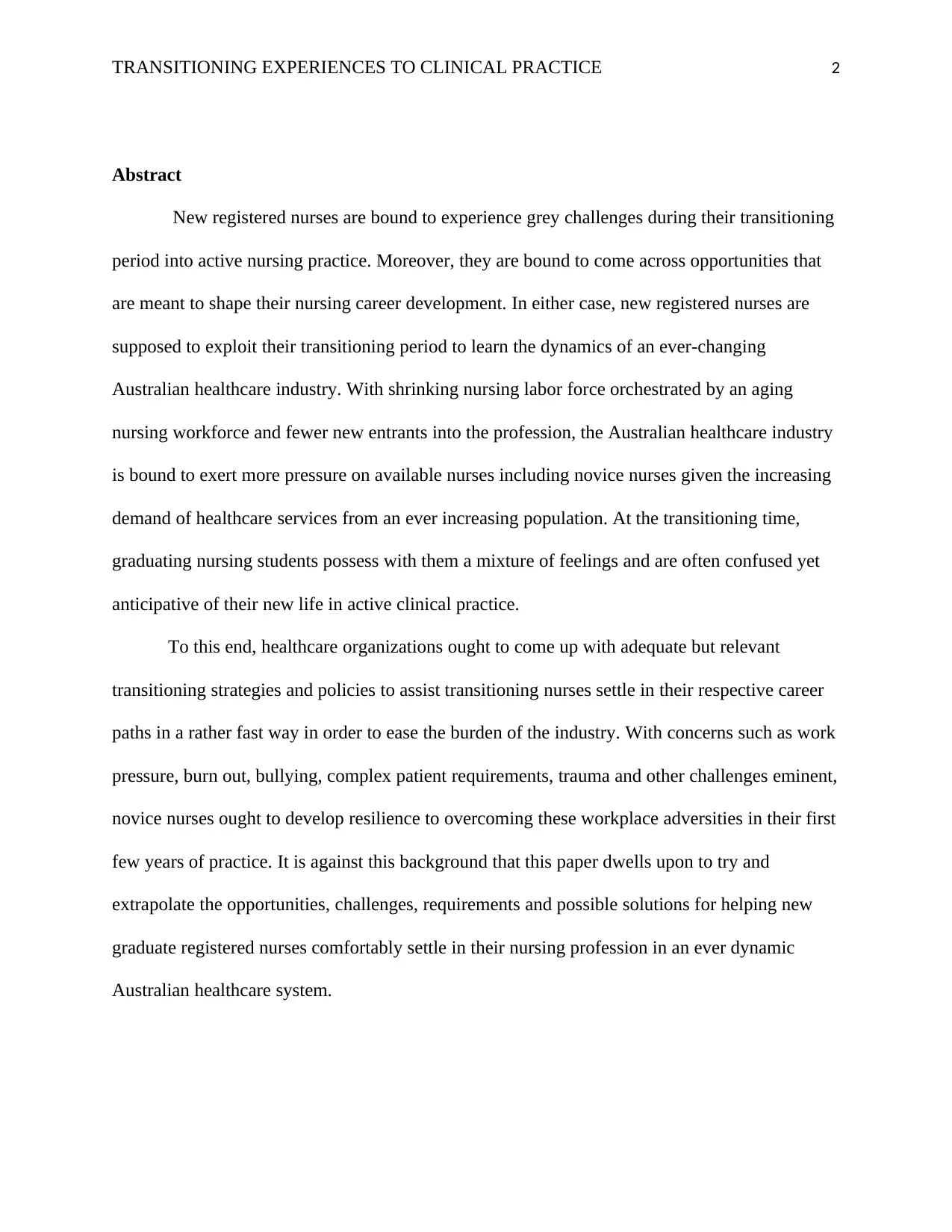
TRANSITIONING EXPERIENCES TO CLINICAL PRACTICE 2
Abstract
New registered nurses are bound to experience grey challenges during their transitioning
period into active nursing practice. Moreover, they are bound to come across opportunities that
are meant to shape their nursing career development. In either case, new registered nurses are
supposed to exploit their transitioning period to learn the dynamics of an ever-changing
Australian healthcare industry. With shrinking nursing labor force orchestrated by an aging
nursing workforce and fewer new entrants into the profession, the Australian healthcare industry
is bound to exert more pressure on available nurses including novice nurses given the increasing
demand of healthcare services from an ever increasing population. At the transitioning time,
graduating nursing students possess with them a mixture of feelings and are often confused yet
anticipative of their new life in active clinical practice.
To this end, healthcare organizations ought to come up with adequate but relevant
transitioning strategies and policies to assist transitioning nurses settle in their respective career
paths in a rather fast way in order to ease the burden of the industry. With concerns such as work
pressure, burn out, bullying, complex patient requirements, trauma and other challenges eminent,
novice nurses ought to develop resilience to overcoming these workplace adversities in their first
few years of practice. It is against this background that this paper dwells upon to try and
extrapolate the opportunities, challenges, requirements and possible solutions for helping new
graduate registered nurses comfortably settle in their nursing profession in an ever dynamic
Australian healthcare system.
Abstract
New registered nurses are bound to experience grey challenges during their transitioning
period into active nursing practice. Moreover, they are bound to come across opportunities that
are meant to shape their nursing career development. In either case, new registered nurses are
supposed to exploit their transitioning period to learn the dynamics of an ever-changing
Australian healthcare industry. With shrinking nursing labor force orchestrated by an aging
nursing workforce and fewer new entrants into the profession, the Australian healthcare industry
is bound to exert more pressure on available nurses including novice nurses given the increasing
demand of healthcare services from an ever increasing population. At the transitioning time,
graduating nursing students possess with them a mixture of feelings and are often confused yet
anticipative of their new life in active clinical practice.
To this end, healthcare organizations ought to come up with adequate but relevant
transitioning strategies and policies to assist transitioning nurses settle in their respective career
paths in a rather fast way in order to ease the burden of the industry. With concerns such as work
pressure, burn out, bullying, complex patient requirements, trauma and other challenges eminent,
novice nurses ought to develop resilience to overcoming these workplace adversities in their first
few years of practice. It is against this background that this paper dwells upon to try and
extrapolate the opportunities, challenges, requirements and possible solutions for helping new
graduate registered nurses comfortably settle in their nursing profession in an ever dynamic
Australian healthcare system.
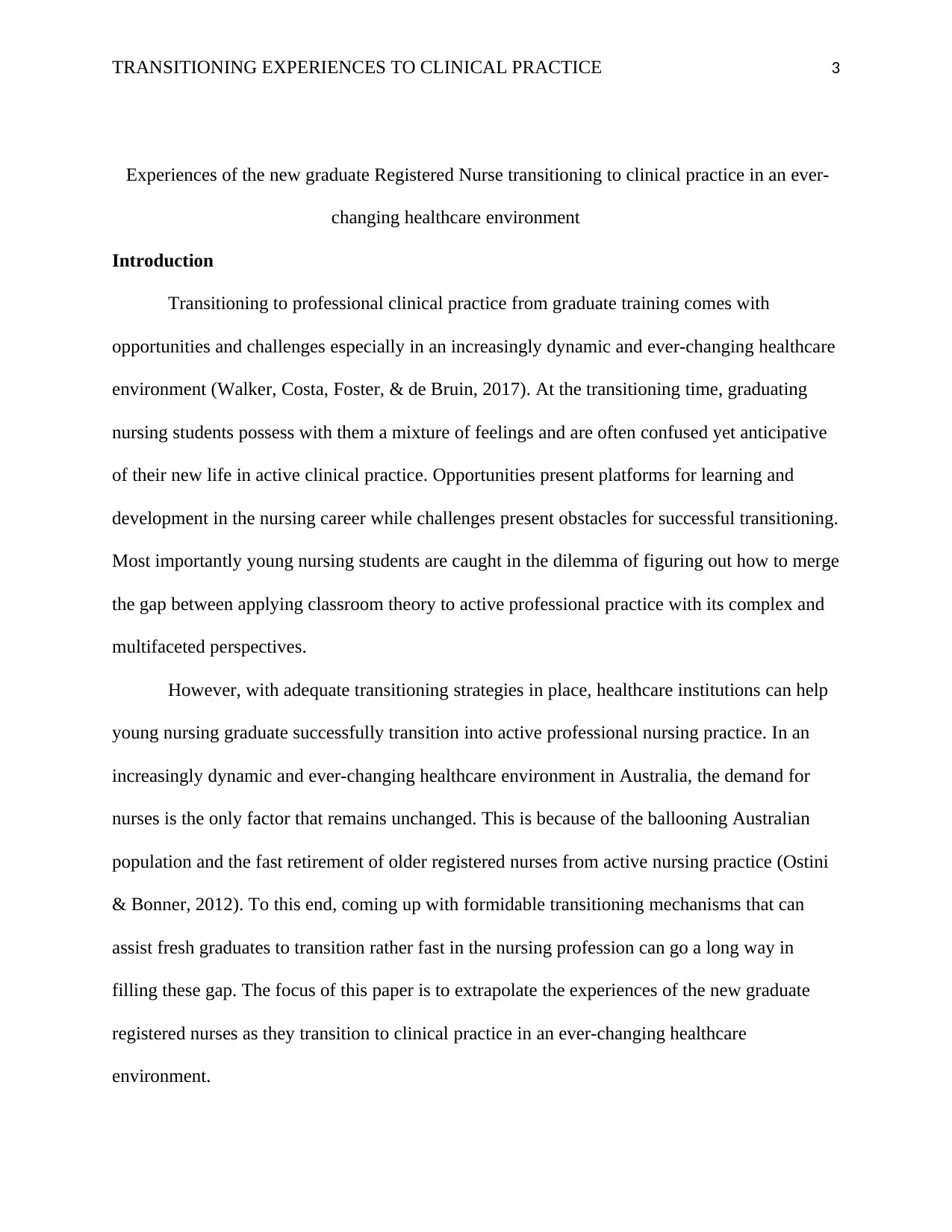
TRANSITIONING EXPERIENCES TO CLINICAL PRACTICE 3
Experiences of the new graduate Registered Nurse transitioning to clinical practice in an ever-
changing healthcare environment
Introduction
Transitioning to professional clinical practice from graduate training comes with
opportunities and challenges especially in an increasingly dynamic and ever-changing healthcare
environment (Walker, Costa, Foster, & de Bruin, 2017). At the transitioning time, graduating
nursing students possess with them a mixture of feelings and are often confused yet anticipative
of their new life in active clinical practice. Opportunities present platforms for learning and
development in the nursing career while challenges present obstacles for successful transitioning.
Most importantly young nursing students are caught in the dilemma of figuring out how to merge
the gap between applying classroom theory to active professional practice with its complex and
multifaceted perspectives.
However, with adequate transitioning strategies in place, healthcare institutions can help
young nursing graduate successfully transition into active professional nursing practice. In an
increasingly dynamic and ever-changing healthcare environment in Australia, the demand for
nurses is the only factor that remains unchanged. This is because of the ballooning Australian
population and the fast retirement of older registered nurses from active nursing practice (Ostini
& Bonner, 2012). To this end, coming up with formidable transitioning mechanisms that can
assist fresh graduates to transition rather fast in the nursing profession can go a long way in
filling these gap. The focus of this paper is to extrapolate the experiences of the new graduate
registered nurses as they transition to clinical practice in an ever-changing healthcare
environment.
Experiences of the new graduate Registered Nurse transitioning to clinical practice in an ever-
changing healthcare environment
Introduction
Transitioning to professional clinical practice from graduate training comes with
opportunities and challenges especially in an increasingly dynamic and ever-changing healthcare
environment (Walker, Costa, Foster, & de Bruin, 2017). At the transitioning time, graduating
nursing students possess with them a mixture of feelings and are often confused yet anticipative
of their new life in active clinical practice. Opportunities present platforms for learning and
development in the nursing career while challenges present obstacles for successful transitioning.
Most importantly young nursing students are caught in the dilemma of figuring out how to merge
the gap between applying classroom theory to active professional practice with its complex and
multifaceted perspectives.
However, with adequate transitioning strategies in place, healthcare institutions can help
young nursing graduate successfully transition into active professional nursing practice. In an
increasingly dynamic and ever-changing healthcare environment in Australia, the demand for
nurses is the only factor that remains unchanged. This is because of the ballooning Australian
population and the fast retirement of older registered nurses from active nursing practice (Ostini
& Bonner, 2012). To this end, coming up with formidable transitioning mechanisms that can
assist fresh graduates to transition rather fast in the nursing profession can go a long way in
filling these gap. The focus of this paper is to extrapolate the experiences of the new graduate
registered nurses as they transition to clinical practice in an ever-changing healthcare
environment.
⊘ This is a preview!⊘
Do you want full access?
Subscribe today to unlock all pages.

Trusted by 1+ million students worldwide
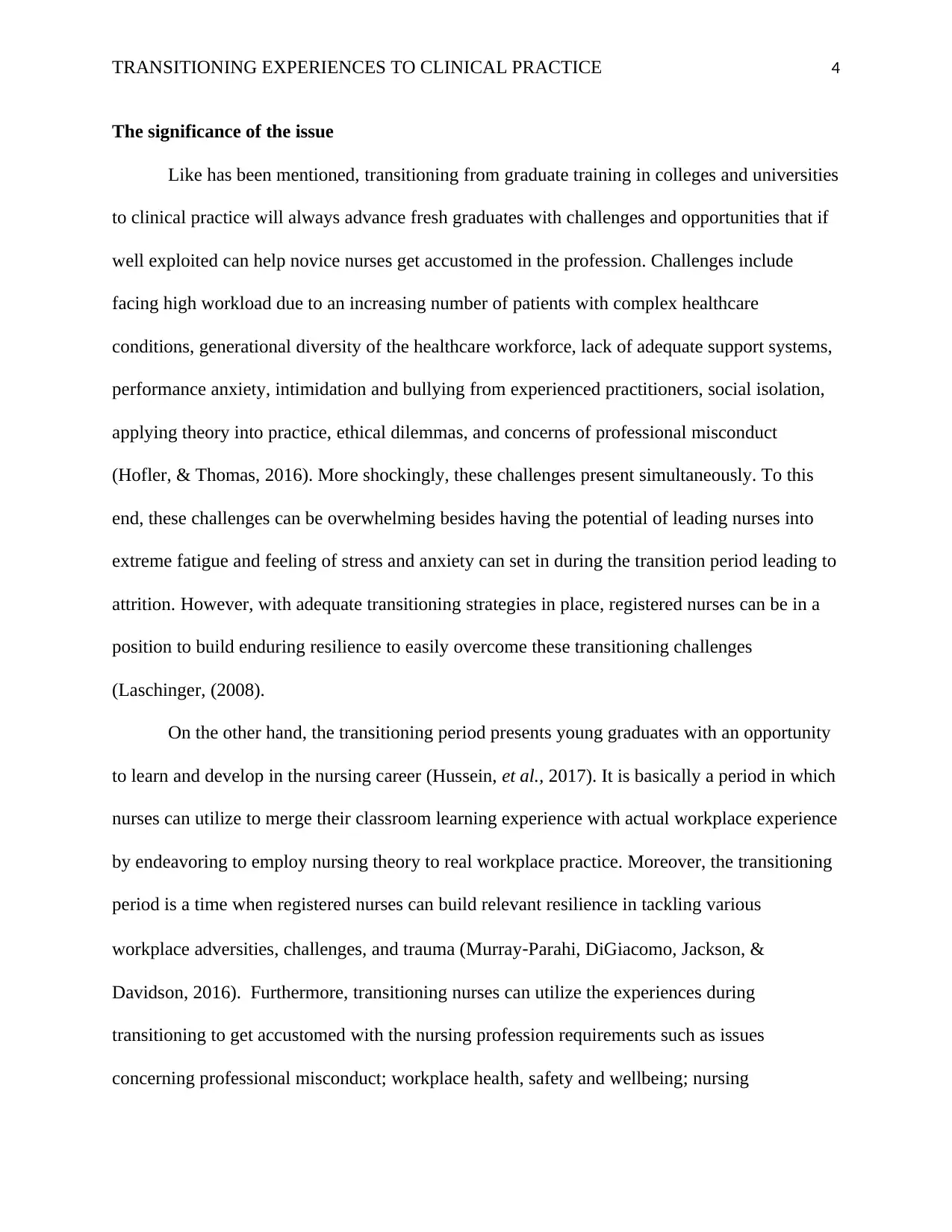
TRANSITIONING EXPERIENCES TO CLINICAL PRACTICE 4
The significance of the issue
Like has been mentioned, transitioning from graduate training in colleges and universities
to clinical practice will always advance fresh graduates with challenges and opportunities that if
well exploited can help novice nurses get accustomed in the profession. Challenges include
facing high workload due to an increasing number of patients with complex healthcare
conditions, generational diversity of the healthcare workforce, lack of adequate support systems,
performance anxiety, intimidation and bullying from experienced practitioners, social isolation,
applying theory into practice, ethical dilemmas, and concerns of professional misconduct
(Hofler, & Thomas, 2016). More shockingly, these challenges present simultaneously. To this
end, these challenges can be overwhelming besides having the potential of leading nurses into
extreme fatigue and feeling of stress and anxiety can set in during the transition period leading to
attrition. However, with adequate transitioning strategies in place, registered nurses can be in a
position to build enduring resilience to easily overcome these transitioning challenges
(Laschinger, (2008).
On the other hand, the transitioning period presents young graduates with an opportunity
to learn and develop in the nursing career (Hussein, et al., 2017). It is basically a period in which
nurses can utilize to merge their classroom learning experience with actual workplace experience
by endeavoring to employ nursing theory to real workplace practice. Moreover, the transitioning
period is a time when registered nurses can build relevant resilience in tackling various
workplace adversities, challenges, and trauma (Murray‐Parahi, DiGiacomo, Jackson, &
Davidson, 2016). Furthermore, transitioning nurses can utilize the experiences during
transitioning to get accustomed with the nursing profession requirements such as issues
concerning professional misconduct; workplace health, safety and wellbeing; nursing
The significance of the issue
Like has been mentioned, transitioning from graduate training in colleges and universities
to clinical practice will always advance fresh graduates with challenges and opportunities that if
well exploited can help novice nurses get accustomed in the profession. Challenges include
facing high workload due to an increasing number of patients with complex healthcare
conditions, generational diversity of the healthcare workforce, lack of adequate support systems,
performance anxiety, intimidation and bullying from experienced practitioners, social isolation,
applying theory into practice, ethical dilemmas, and concerns of professional misconduct
(Hofler, & Thomas, 2016). More shockingly, these challenges present simultaneously. To this
end, these challenges can be overwhelming besides having the potential of leading nurses into
extreme fatigue and feeling of stress and anxiety can set in during the transition period leading to
attrition. However, with adequate transitioning strategies in place, registered nurses can be in a
position to build enduring resilience to easily overcome these transitioning challenges
(Laschinger, (2008).
On the other hand, the transitioning period presents young graduates with an opportunity
to learn and develop in the nursing career (Hussein, et al., 2017). It is basically a period in which
nurses can utilize to merge their classroom learning experience with actual workplace experience
by endeavoring to employ nursing theory to real workplace practice. Moreover, the transitioning
period is a time when registered nurses can build relevant resilience in tackling various
workplace adversities, challenges, and trauma (Murray‐Parahi, DiGiacomo, Jackson, &
Davidson, 2016). Furthermore, transitioning nurses can utilize the experiences during
transitioning to get accustomed with the nursing profession requirements such as issues
concerning professional misconduct; workplace health, safety and wellbeing; nursing
Paraphrase This Document
Need a fresh take? Get an instant paraphrase of this document with our AI Paraphraser
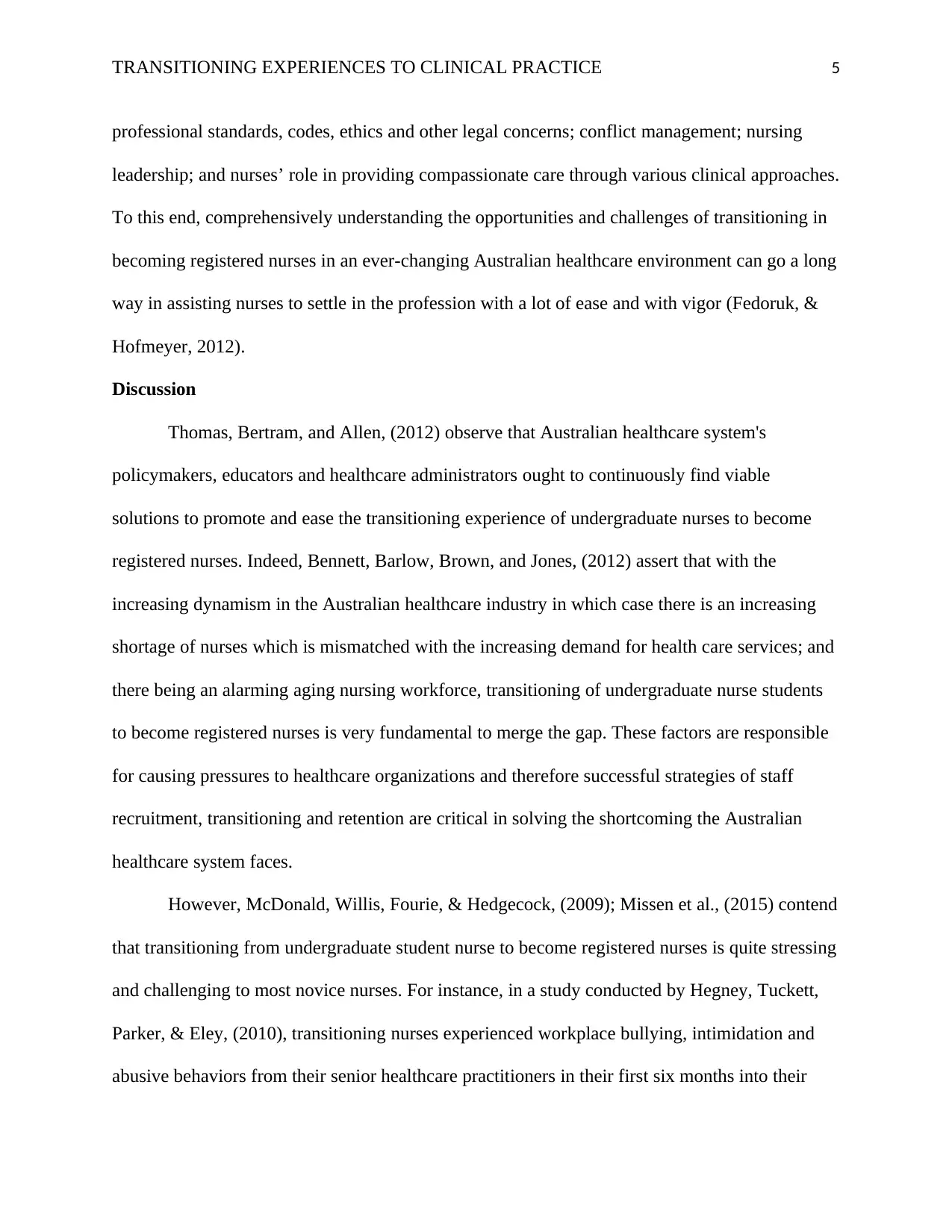
TRANSITIONING EXPERIENCES TO CLINICAL PRACTICE 5
professional standards, codes, ethics and other legal concerns; conflict management; nursing
leadership; and nurses’ role in providing compassionate care through various clinical approaches.
To this end, comprehensively understanding the opportunities and challenges of transitioning in
becoming registered nurses in an ever-changing Australian healthcare environment can go a long
way in assisting nurses to settle in the profession with a lot of ease and with vigor (Fedoruk, &
Hofmeyer, 2012).
Discussion
Thomas, Bertram, and Allen, (2012) observe that Australian healthcare system's
policymakers, educators and healthcare administrators ought to continuously find viable
solutions to promote and ease the transitioning experience of undergraduate nurses to become
registered nurses. Indeed, Bennett, Barlow, Brown, and Jones, (2012) assert that with the
increasing dynamism in the Australian healthcare industry in which case there is an increasing
shortage of nurses which is mismatched with the increasing demand for health care services; and
there being an alarming aging nursing workforce, transitioning of undergraduate nurse students
to become registered nurses is very fundamental to merge the gap. These factors are responsible
for causing pressures to healthcare organizations and therefore successful strategies of staff
recruitment, transitioning and retention are critical in solving the shortcoming the Australian
healthcare system faces.
However, McDonald, Willis, Fourie, & Hedgecock, (2009); Missen et al., (2015) contend
that transitioning from undergraduate student nurse to become registered nurses is quite stressing
and challenging to most novice nurses. For instance, in a study conducted by Hegney, Tuckett,
Parker, & Eley, (2010), transitioning nurses experienced workplace bullying, intimidation and
abusive behaviors from their senior healthcare practitioners in their first six months into their
professional standards, codes, ethics and other legal concerns; conflict management; nursing
leadership; and nurses’ role in providing compassionate care through various clinical approaches.
To this end, comprehensively understanding the opportunities and challenges of transitioning in
becoming registered nurses in an ever-changing Australian healthcare environment can go a long
way in assisting nurses to settle in the profession with a lot of ease and with vigor (Fedoruk, &
Hofmeyer, 2012).
Discussion
Thomas, Bertram, and Allen, (2012) observe that Australian healthcare system's
policymakers, educators and healthcare administrators ought to continuously find viable
solutions to promote and ease the transitioning experience of undergraduate nurses to become
registered nurses. Indeed, Bennett, Barlow, Brown, and Jones, (2012) assert that with the
increasing dynamism in the Australian healthcare industry in which case there is an increasing
shortage of nurses which is mismatched with the increasing demand for health care services; and
there being an alarming aging nursing workforce, transitioning of undergraduate nurse students
to become registered nurses is very fundamental to merge the gap. These factors are responsible
for causing pressures to healthcare organizations and therefore successful strategies of staff
recruitment, transitioning and retention are critical in solving the shortcoming the Australian
healthcare system faces.
However, McDonald, Willis, Fourie, & Hedgecock, (2009); Missen et al., (2015) contend
that transitioning from undergraduate student nurse to become registered nurses is quite stressing
and challenging to most novice nurses. For instance, in a study conducted by Hegney, Tuckett,
Parker, & Eley, (2010), transitioning nurses experienced workplace bullying, intimidation and
abusive behaviors from their senior healthcare practitioners in their first six months into their
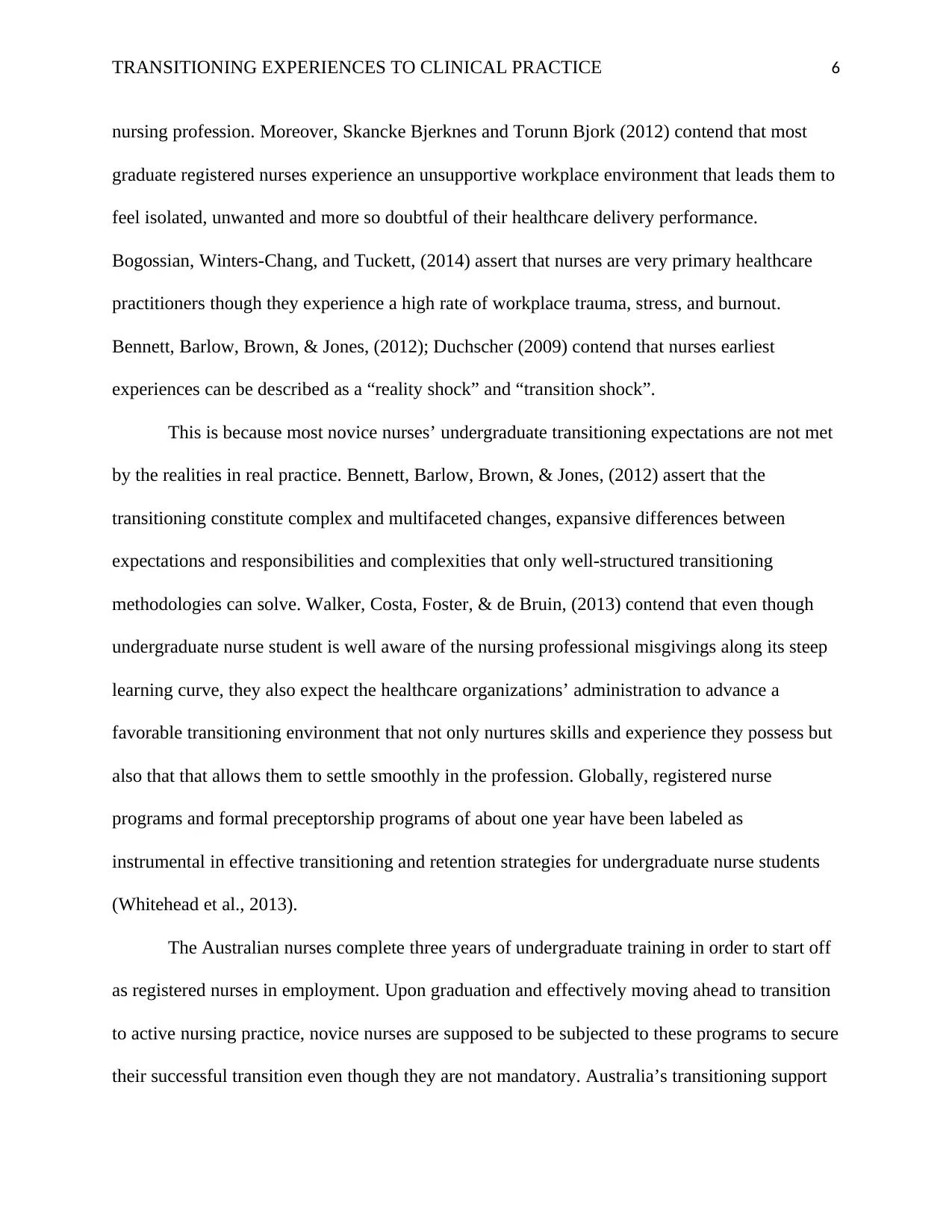
TRANSITIONING EXPERIENCES TO CLINICAL PRACTICE 6
nursing profession. Moreover, Skancke Bjerknes and Torunn Bjork (2012) contend that most
graduate registered nurses experience an unsupportive workplace environment that leads them to
feel isolated, unwanted and more so doubtful of their healthcare delivery performance.
Bogossian, Winters-Chang, and Tuckett, (2014) assert that nurses are very primary healthcare
practitioners though they experience a high rate of workplace trauma, stress, and burnout.
Bennett, Barlow, Brown, & Jones, (2012); Duchscher (2009) contend that nurses earliest
experiences can be described as a “reality shock” and “transition shock”.
This is because most novice nurses’ undergraduate transitioning expectations are not met
by the realities in real practice. Bennett, Barlow, Brown, & Jones, (2012) assert that the
transitioning constitute complex and multifaceted changes, expansive differences between
expectations and responsibilities and complexities that only well-structured transitioning
methodologies can solve. Walker, Costa, Foster, & de Bruin, (2013) contend that even though
undergraduate nurse student is well aware of the nursing professional misgivings along its steep
learning curve, they also expect the healthcare organizations’ administration to advance a
favorable transitioning environment that not only nurtures skills and experience they possess but
also that that allows them to settle smoothly in the profession. Globally, registered nurse
programs and formal preceptorship programs of about one year have been labeled as
instrumental in effective transitioning and retention strategies for undergraduate nurse students
(Whitehead et al., 2013).
The Australian nurses complete three years of undergraduate training in order to start off
as registered nurses in employment. Upon graduation and effectively moving ahead to transition
to active nursing practice, novice nurses are supposed to be subjected to these programs to secure
their successful transition even though they are not mandatory. Australia’s transitioning support
nursing profession. Moreover, Skancke Bjerknes and Torunn Bjork (2012) contend that most
graduate registered nurses experience an unsupportive workplace environment that leads them to
feel isolated, unwanted and more so doubtful of their healthcare delivery performance.
Bogossian, Winters-Chang, and Tuckett, (2014) assert that nurses are very primary healthcare
practitioners though they experience a high rate of workplace trauma, stress, and burnout.
Bennett, Barlow, Brown, & Jones, (2012); Duchscher (2009) contend that nurses earliest
experiences can be described as a “reality shock” and “transition shock”.
This is because most novice nurses’ undergraduate transitioning expectations are not met
by the realities in real practice. Bennett, Barlow, Brown, & Jones, (2012) assert that the
transitioning constitute complex and multifaceted changes, expansive differences between
expectations and responsibilities and complexities that only well-structured transitioning
methodologies can solve. Walker, Costa, Foster, & de Bruin, (2013) contend that even though
undergraduate nurse student is well aware of the nursing professional misgivings along its steep
learning curve, they also expect the healthcare organizations’ administration to advance a
favorable transitioning environment that not only nurtures skills and experience they possess but
also that that allows them to settle smoothly in the profession. Globally, registered nurse
programs and formal preceptorship programs of about one year have been labeled as
instrumental in effective transitioning and retention strategies for undergraduate nurse students
(Whitehead et al., 2013).
The Australian nurses complete three years of undergraduate training in order to start off
as registered nurses in employment. Upon graduation and effectively moving ahead to transition
to active nursing practice, novice nurses are supposed to be subjected to these programs to secure
their successful transition even though they are not mandatory. Australia’s transitioning support
⊘ This is a preview!⊘
Do you want full access?
Subscribe today to unlock all pages.

Trusted by 1+ million students worldwide
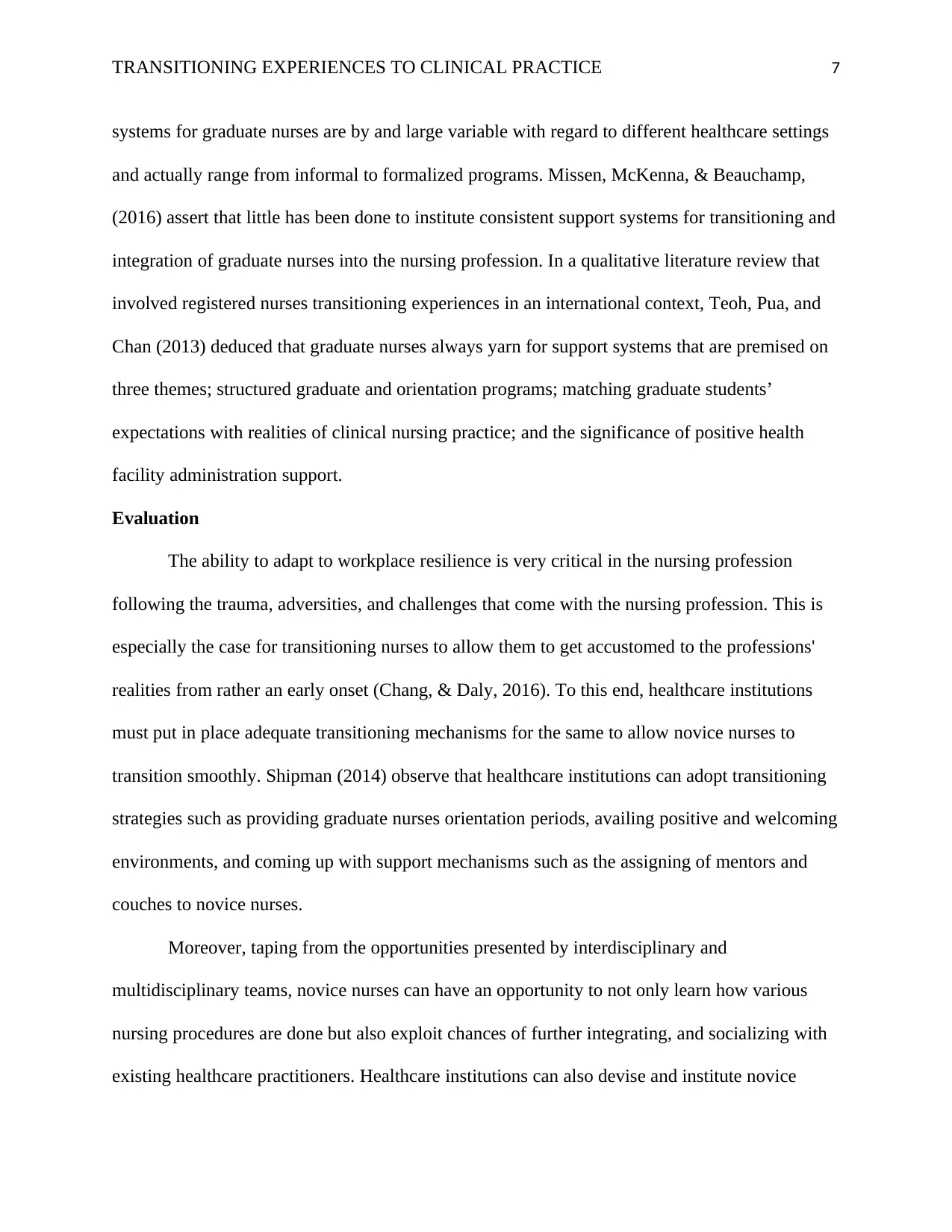
TRANSITIONING EXPERIENCES TO CLINICAL PRACTICE 7
systems for graduate nurses are by and large variable with regard to different healthcare settings
and actually range from informal to formalized programs. Missen, McKenna, & Beauchamp,
(2016) assert that little has been done to institute consistent support systems for transitioning and
integration of graduate nurses into the nursing profession. In a qualitative literature review that
involved registered nurses transitioning experiences in an international context, Teoh, Pua, and
Chan (2013) deduced that graduate nurses always yarn for support systems that are premised on
three themes; structured graduate and orientation programs; matching graduate students’
expectations with realities of clinical nursing practice; and the significance of positive health
facility administration support.
Evaluation
The ability to adapt to workplace resilience is very critical in the nursing profession
following the trauma, adversities, and challenges that come with the nursing profession. This is
especially the case for transitioning nurses to allow them to get accustomed to the professions'
realities from rather an early onset (Chang, & Daly, 2016). To this end, healthcare institutions
must put in place adequate transitioning mechanisms for the same to allow novice nurses to
transition smoothly. Shipman (2014) observe that healthcare institutions can adopt transitioning
strategies such as providing graduate nurses orientation periods, availing positive and welcoming
environments, and coming up with support mechanisms such as the assigning of mentors and
couches to novice nurses.
Moreover, taping from the opportunities presented by interdisciplinary and
multidisciplinary teams, novice nurses can have an opportunity to not only learn how various
nursing procedures are done but also exploit chances of further integrating, and socializing with
existing healthcare practitioners. Healthcare institutions can also devise and institute novice
systems for graduate nurses are by and large variable with regard to different healthcare settings
and actually range from informal to formalized programs. Missen, McKenna, & Beauchamp,
(2016) assert that little has been done to institute consistent support systems for transitioning and
integration of graduate nurses into the nursing profession. In a qualitative literature review that
involved registered nurses transitioning experiences in an international context, Teoh, Pua, and
Chan (2013) deduced that graduate nurses always yarn for support systems that are premised on
three themes; structured graduate and orientation programs; matching graduate students’
expectations with realities of clinical nursing practice; and the significance of positive health
facility administration support.
Evaluation
The ability to adapt to workplace resilience is very critical in the nursing profession
following the trauma, adversities, and challenges that come with the nursing profession. This is
especially the case for transitioning nurses to allow them to get accustomed to the professions'
realities from rather an early onset (Chang, & Daly, 2016). To this end, healthcare institutions
must put in place adequate transitioning mechanisms for the same to allow novice nurses to
transition smoothly. Shipman (2014) observe that healthcare institutions can adopt transitioning
strategies such as providing graduate nurses orientation periods, availing positive and welcoming
environments, and coming up with support mechanisms such as the assigning of mentors and
couches to novice nurses.
Moreover, taping from the opportunities presented by interdisciplinary and
multidisciplinary teams, novice nurses can have an opportunity to not only learn how various
nursing procedures are done but also exploit chances of further integrating, and socializing with
existing healthcare practitioners. Healthcare institutions can also devise and institute novice
Paraphrase This Document
Need a fresh take? Get an instant paraphrase of this document with our AI Paraphraser
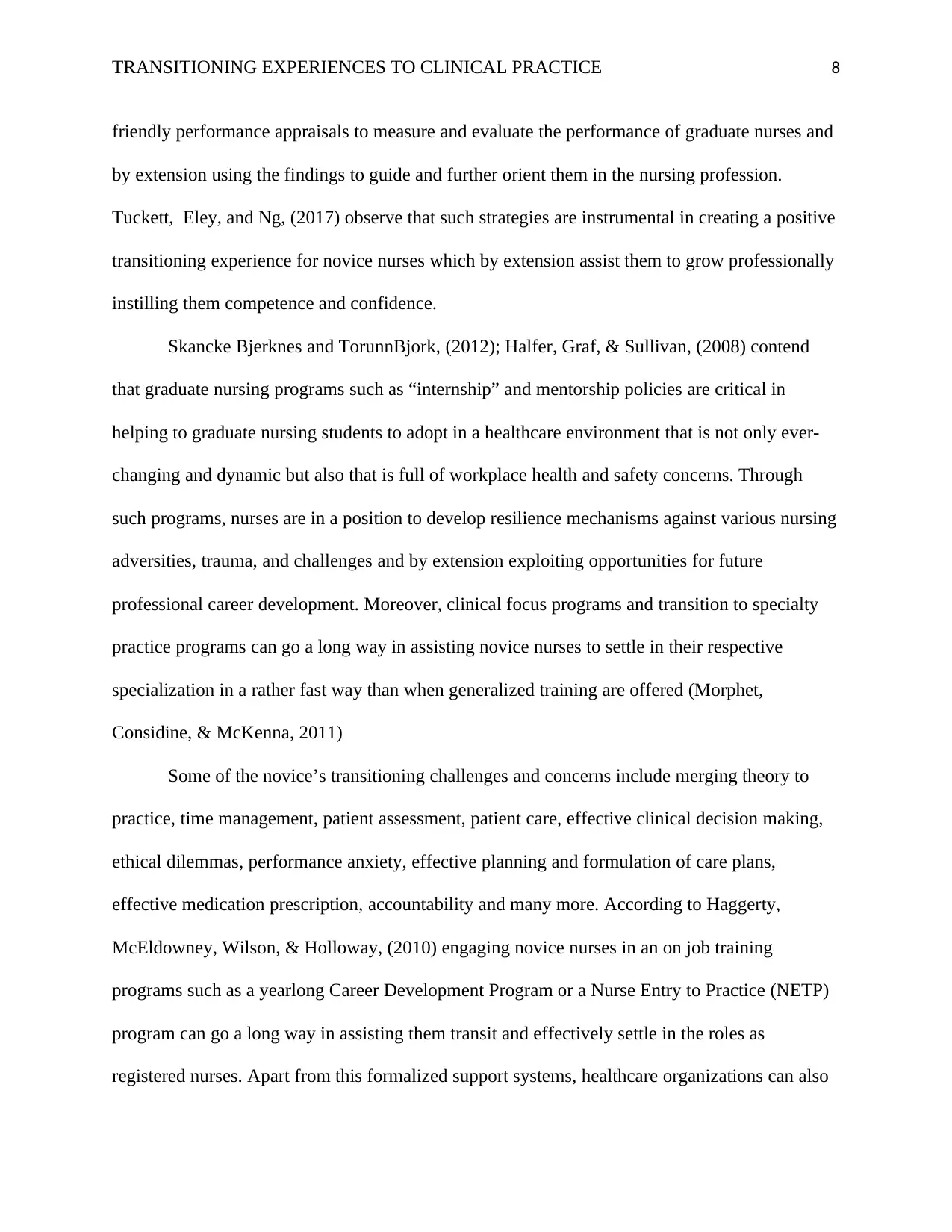
TRANSITIONING EXPERIENCES TO CLINICAL PRACTICE 8
friendly performance appraisals to measure and evaluate the performance of graduate nurses and
by extension using the findings to guide and further orient them in the nursing profession.
Tuckett, Eley, and Ng, (2017) observe that such strategies are instrumental in creating a positive
transitioning experience for novice nurses which by extension assist them to grow professionally
instilling them competence and confidence.
Skancke Bjerknes and TorunnBjork, (2012); Halfer, Graf, & Sullivan, (2008) contend
that graduate nursing programs such as “internship” and mentorship policies are critical in
helping to graduate nursing students to adopt in a healthcare environment that is not only ever-
changing and dynamic but also that is full of workplace health and safety concerns. Through
such programs, nurses are in a position to develop resilience mechanisms against various nursing
adversities, trauma, and challenges and by extension exploiting opportunities for future
professional career development. Moreover, clinical focus programs and transition to specialty
practice programs can go a long way in assisting novice nurses to settle in their respective
specialization in a rather fast way than when generalized training are offered (Morphet,
Considine, & McKenna, 2011)
Some of the novice’s transitioning challenges and concerns include merging theory to
practice, time management, patient assessment, patient care, effective clinical decision making,
ethical dilemmas, performance anxiety, effective planning and formulation of care plans,
effective medication prescription, accountability and many more. According to Haggerty,
McEldowney, Wilson, & Holloway, (2010) engaging novice nurses in an on job training
programs such as a yearlong Career Development Program or a Nurse Entry to Practice (NETP)
program can go a long way in assisting them transit and effectively settle in the roles as
registered nurses. Apart from this formalized support systems, healthcare organizations can also
friendly performance appraisals to measure and evaluate the performance of graduate nurses and
by extension using the findings to guide and further orient them in the nursing profession.
Tuckett, Eley, and Ng, (2017) observe that such strategies are instrumental in creating a positive
transitioning experience for novice nurses which by extension assist them to grow professionally
instilling them competence and confidence.
Skancke Bjerknes and TorunnBjork, (2012); Halfer, Graf, & Sullivan, (2008) contend
that graduate nursing programs such as “internship” and mentorship policies are critical in
helping to graduate nursing students to adopt in a healthcare environment that is not only ever-
changing and dynamic but also that is full of workplace health and safety concerns. Through
such programs, nurses are in a position to develop resilience mechanisms against various nursing
adversities, trauma, and challenges and by extension exploiting opportunities for future
professional career development. Moreover, clinical focus programs and transition to specialty
practice programs can go a long way in assisting novice nurses to settle in their respective
specialization in a rather fast way than when generalized training are offered (Morphet,
Considine, & McKenna, 2011)
Some of the novice’s transitioning challenges and concerns include merging theory to
practice, time management, patient assessment, patient care, effective clinical decision making,
ethical dilemmas, performance anxiety, effective planning and formulation of care plans,
effective medication prescription, accountability and many more. According to Haggerty,
McEldowney, Wilson, & Holloway, (2010) engaging novice nurses in an on job training
programs such as a yearlong Career Development Program or a Nurse Entry to Practice (NETP)
program can go a long way in assisting them transit and effectively settle in the roles as
registered nurses. Apart from this formalized support systems, healthcare organizations can also
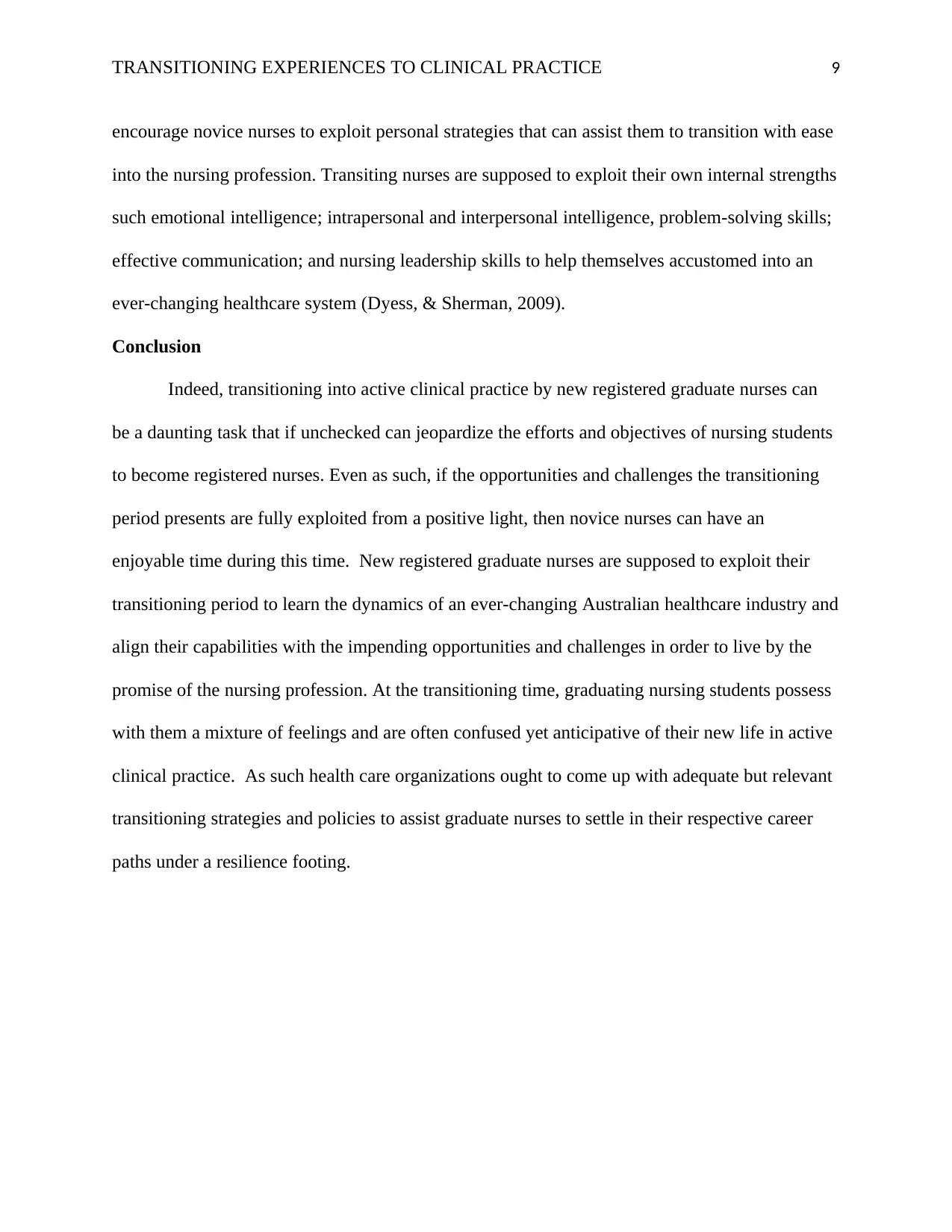
TRANSITIONING EXPERIENCES TO CLINICAL PRACTICE 9
encourage novice nurses to exploit personal strategies that can assist them to transition with ease
into the nursing profession. Transiting nurses are supposed to exploit their own internal strengths
such emotional intelligence; intrapersonal and interpersonal intelligence, problem-solving skills;
effective communication; and nursing leadership skills to help themselves accustomed into an
ever-changing healthcare system (Dyess, & Sherman, 2009).
Conclusion
Indeed, transitioning into active clinical practice by new registered graduate nurses can
be a daunting task that if unchecked can jeopardize the efforts and objectives of nursing students
to become registered nurses. Even as such, if the opportunities and challenges the transitioning
period presents are fully exploited from a positive light, then novice nurses can have an
enjoyable time during this time. New registered graduate nurses are supposed to exploit their
transitioning period to learn the dynamics of an ever-changing Australian healthcare industry and
align their capabilities with the impending opportunities and challenges in order to live by the
promise of the nursing profession. At the transitioning time, graduating nursing students possess
with them a mixture of feelings and are often confused yet anticipative of their new life in active
clinical practice. As such health care organizations ought to come up with adequate but relevant
transitioning strategies and policies to assist graduate nurses to settle in their respective career
paths under a resilience footing.
encourage novice nurses to exploit personal strategies that can assist them to transition with ease
into the nursing profession. Transiting nurses are supposed to exploit their own internal strengths
such emotional intelligence; intrapersonal and interpersonal intelligence, problem-solving skills;
effective communication; and nursing leadership skills to help themselves accustomed into an
ever-changing healthcare system (Dyess, & Sherman, 2009).
Conclusion
Indeed, transitioning into active clinical practice by new registered graduate nurses can
be a daunting task that if unchecked can jeopardize the efforts and objectives of nursing students
to become registered nurses. Even as such, if the opportunities and challenges the transitioning
period presents are fully exploited from a positive light, then novice nurses can have an
enjoyable time during this time. New registered graduate nurses are supposed to exploit their
transitioning period to learn the dynamics of an ever-changing Australian healthcare industry and
align their capabilities with the impending opportunities and challenges in order to live by the
promise of the nursing profession. At the transitioning time, graduating nursing students possess
with them a mixture of feelings and are often confused yet anticipative of their new life in active
clinical practice. As such health care organizations ought to come up with adequate but relevant
transitioning strategies and policies to assist graduate nurses to settle in their respective career
paths under a resilience footing.
⊘ This is a preview!⊘
Do you want full access?
Subscribe today to unlock all pages.

Trusted by 1+ million students worldwide
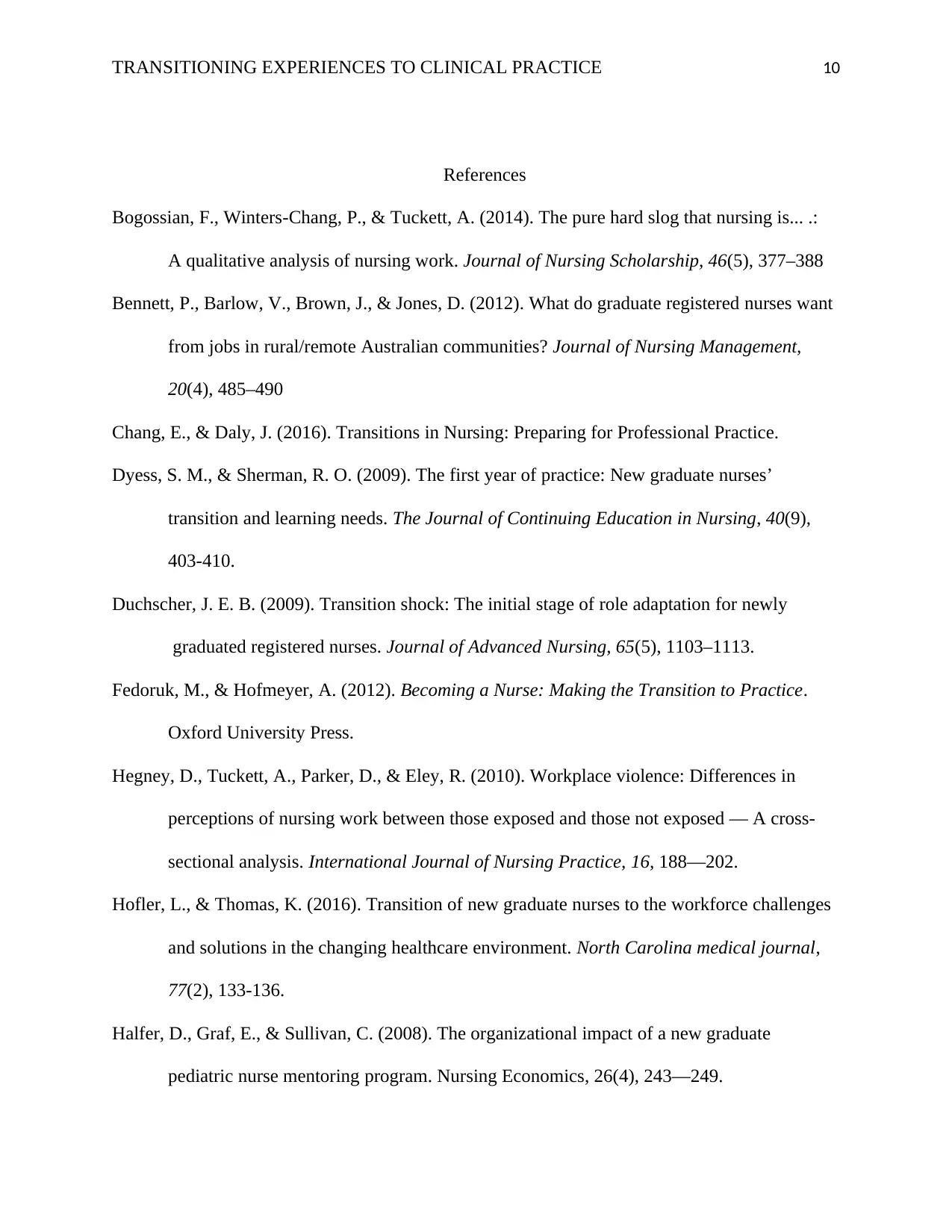
TRANSITIONING EXPERIENCES TO CLINICAL PRACTICE 10
References
Bogossian, F., Winters-Chang, P., & Tuckett, A. (2014). The pure hard slog that nursing is... .:
A qualitative analysis of nursing work. Journal of Nursing Scholarship, 46(5), 377–388
Bennett, P., Barlow, V., Brown, J., & Jones, D. (2012). What do graduate registered nurses want
from jobs in rural/remote Australian communities? Journal of Nursing Management,
20(4), 485–490
Chang, E., & Daly, J. (2016). Transitions in Nursing: Preparing for Professional Practice.
Dyess, S. M., & Sherman, R. O. (2009). The first year of practice: New graduate nurses’
transition and learning needs. The Journal of Continuing Education in Nursing, 40(9),
403-410.
Duchscher, J. E. B. (2009). Transition shock: The initial stage of role adaptation for newly
graduated registered nurses. Journal of Advanced Nursing, 65(5), 1103–1113.
Fedoruk, M., & Hofmeyer, A. (2012). Becoming a Nurse: Making the Transition to Practice.
Oxford University Press.
Hegney, D., Tuckett, A., Parker, D., & Eley, R. (2010). Workplace violence: Differences in
perceptions of nursing work between those exposed and those not exposed — A cross-
sectional analysis. International Journal of Nursing Practice, 16, 188—202.
Hofler, L., & Thomas, K. (2016). Transition of new graduate nurses to the workforce challenges
and solutions in the changing healthcare environment. North Carolina medical journal,
77(2), 133-136.
Halfer, D., Graf, E., & Sullivan, C. (2008). The organizational impact of a new graduate
pediatric nurse mentoring program. Nursing Economics, 26(4), 243—249.
References
Bogossian, F., Winters-Chang, P., & Tuckett, A. (2014). The pure hard slog that nursing is... .:
A qualitative analysis of nursing work. Journal of Nursing Scholarship, 46(5), 377–388
Bennett, P., Barlow, V., Brown, J., & Jones, D. (2012). What do graduate registered nurses want
from jobs in rural/remote Australian communities? Journal of Nursing Management,
20(4), 485–490
Chang, E., & Daly, J. (2016). Transitions in Nursing: Preparing for Professional Practice.
Dyess, S. M., & Sherman, R. O. (2009). The first year of practice: New graduate nurses’
transition and learning needs. The Journal of Continuing Education in Nursing, 40(9),
403-410.
Duchscher, J. E. B. (2009). Transition shock: The initial stage of role adaptation for newly
graduated registered nurses. Journal of Advanced Nursing, 65(5), 1103–1113.
Fedoruk, M., & Hofmeyer, A. (2012). Becoming a Nurse: Making the Transition to Practice.
Oxford University Press.
Hegney, D., Tuckett, A., Parker, D., & Eley, R. (2010). Workplace violence: Differences in
perceptions of nursing work between those exposed and those not exposed — A cross-
sectional analysis. International Journal of Nursing Practice, 16, 188—202.
Hofler, L., & Thomas, K. (2016). Transition of new graduate nurses to the workforce challenges
and solutions in the changing healthcare environment. North Carolina medical journal,
77(2), 133-136.
Halfer, D., Graf, E., & Sullivan, C. (2008). The organizational impact of a new graduate
pediatric nurse mentoring program. Nursing Economics, 26(4), 243—249.
Paraphrase This Document
Need a fresh take? Get an instant paraphrase of this document with our AI Paraphraser
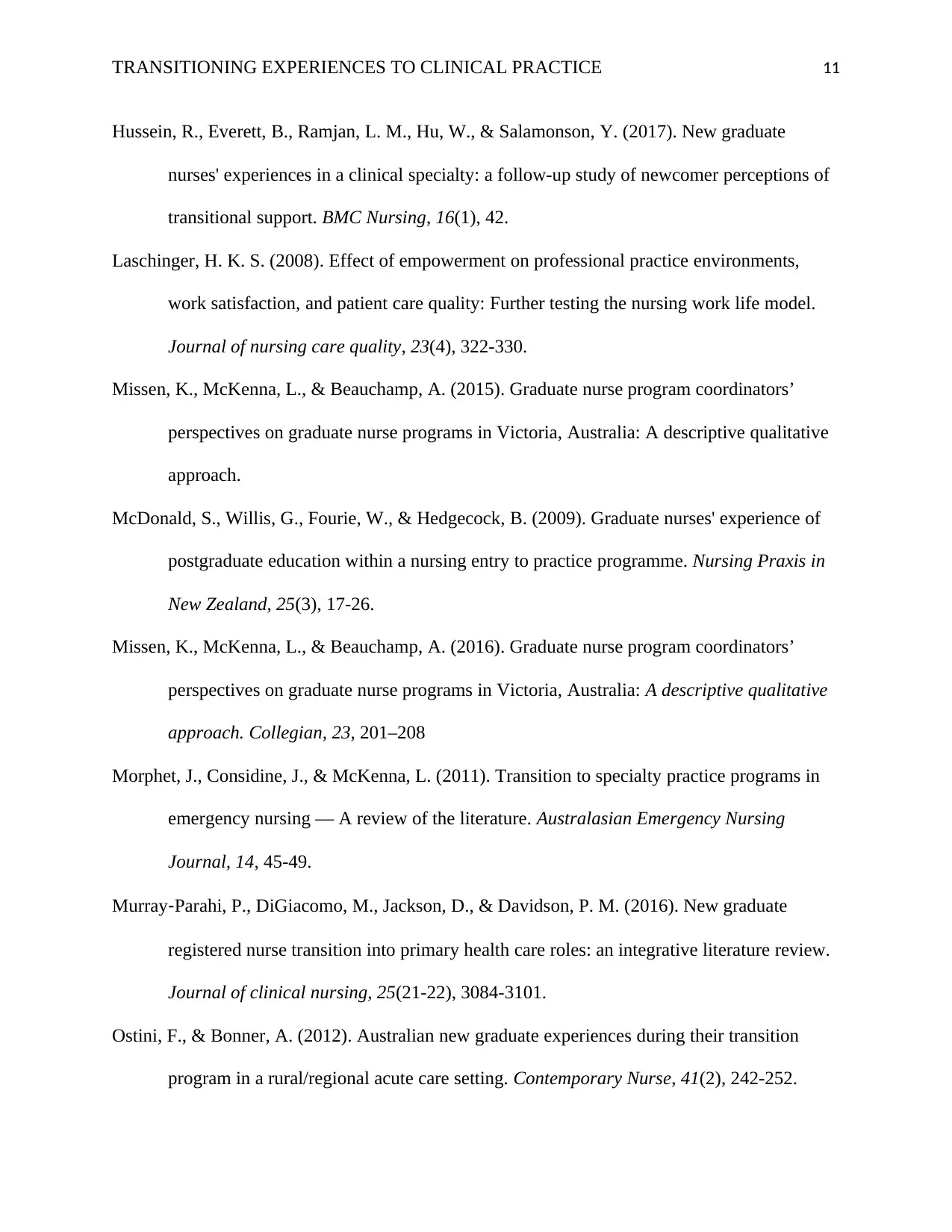
TRANSITIONING EXPERIENCES TO CLINICAL PRACTICE 11
Hussein, R., Everett, B., Ramjan, L. M., Hu, W., & Salamonson, Y. (2017). New graduate
nurses' experiences in a clinical specialty: a follow-up study of newcomer perceptions of
transitional support. BMC Nursing, 16(1), 42.
Laschinger, H. K. S. (2008). Effect of empowerment on professional practice environments,
work satisfaction, and patient care quality: Further testing the nursing work life model.
Journal of nursing care quality, 23(4), 322-330.
Missen, K., McKenna, L., & Beauchamp, A. (2015). Graduate nurse program coordinators’
perspectives on graduate nurse programs in Victoria, Australia: A descriptive qualitative
approach.
McDonald, S., Willis, G., Fourie, W., & Hedgecock, B. (2009). Graduate nurses' experience of
postgraduate education within a nursing entry to practice programme. Nursing Praxis in
New Zealand, 25(3), 17-26.
Missen, K., McKenna, L., & Beauchamp, A. (2016). Graduate nurse program coordinators’
perspectives on graduate nurse programs in Victoria, Australia: A descriptive qualitative
approach. Collegian, 23, 201–208
Morphet, J., Considine, J., & McKenna, L. (2011). Transition to specialty practice programs in
emergency nursing — A review of the literature. Australasian Emergency Nursing
Journal, 14, 45-49.
Murray‐Parahi, P., DiGiacomo, M., Jackson, D., & Davidson, P. M. (2016). New graduate
registered nurse transition into primary health care roles: an integrative literature review.
Journal of clinical nursing, 25(21-22), 3084-3101.
Ostini, F., & Bonner, A. (2012). Australian new graduate experiences during their transition
program in a rural/regional acute care setting. Contemporary Nurse, 41(2), 242-252.
Hussein, R., Everett, B., Ramjan, L. M., Hu, W., & Salamonson, Y. (2017). New graduate
nurses' experiences in a clinical specialty: a follow-up study of newcomer perceptions of
transitional support. BMC Nursing, 16(1), 42.
Laschinger, H. K. S. (2008). Effect of empowerment on professional practice environments,
work satisfaction, and patient care quality: Further testing the nursing work life model.
Journal of nursing care quality, 23(4), 322-330.
Missen, K., McKenna, L., & Beauchamp, A. (2015). Graduate nurse program coordinators’
perspectives on graduate nurse programs in Victoria, Australia: A descriptive qualitative
approach.
McDonald, S., Willis, G., Fourie, W., & Hedgecock, B. (2009). Graduate nurses' experience of
postgraduate education within a nursing entry to practice programme. Nursing Praxis in
New Zealand, 25(3), 17-26.
Missen, K., McKenna, L., & Beauchamp, A. (2016). Graduate nurse program coordinators’
perspectives on graduate nurse programs in Victoria, Australia: A descriptive qualitative
approach. Collegian, 23, 201–208
Morphet, J., Considine, J., & McKenna, L. (2011). Transition to specialty practice programs in
emergency nursing — A review of the literature. Australasian Emergency Nursing
Journal, 14, 45-49.
Murray‐Parahi, P., DiGiacomo, M., Jackson, D., & Davidson, P. M. (2016). New graduate
registered nurse transition into primary health care roles: an integrative literature review.
Journal of clinical nursing, 25(21-22), 3084-3101.
Ostini, F., & Bonner, A. (2012). Australian new graduate experiences during their transition
program in a rural/regional acute care setting. Contemporary Nurse, 41(2), 242-252.
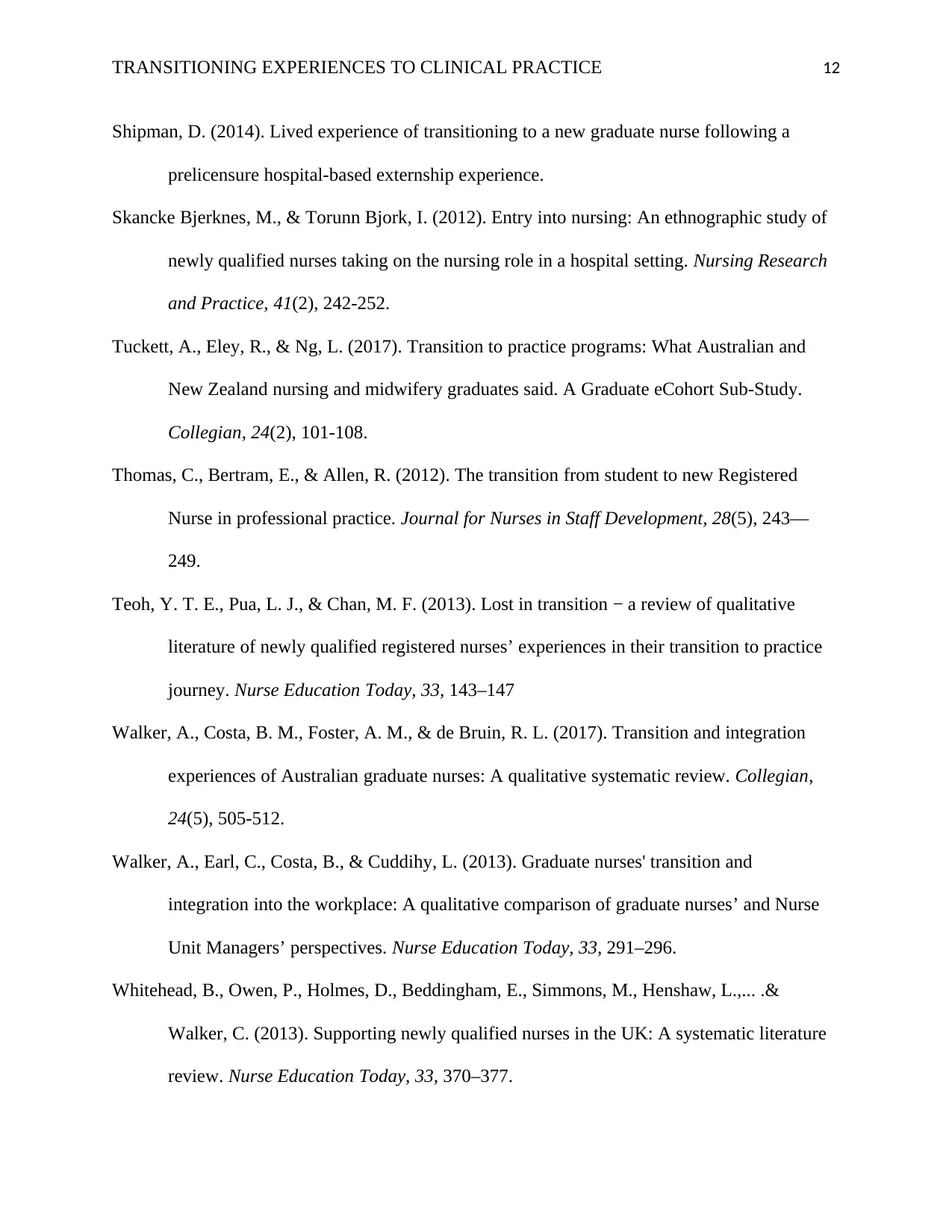
TRANSITIONING EXPERIENCES TO CLINICAL PRACTICE 12
Shipman, D. (2014). Lived experience of transitioning to a new graduate nurse following a
prelicensure hospital-based externship experience.
Skancke Bjerknes, M., & Torunn Bjork, I. (2012). Entry into nursing: An ethnographic study of
newly qualified nurses taking on the nursing role in a hospital setting. Nursing Research
and Practice, 41(2), 242-252.
Tuckett, A., Eley, R., & Ng, L. (2017). Transition to practice programs: What Australian and
New Zealand nursing and midwifery graduates said. A Graduate eCohort Sub-Study.
Collegian, 24(2), 101-108.
Thomas, C., Bertram, E., & Allen, R. (2012). The transition from student to new Registered
Nurse in professional practice. Journal for Nurses in Staff Development, 28(5), 243—
249.
Teoh, Y. T. E., Pua, L. J., & Chan, M. F. (2013). Lost in transition − a review of qualitative
literature of newly qualified registered nurses’ experiences in their transition to practice
journey. Nurse Education Today, 33, 143–147
Walker, A., Costa, B. M., Foster, A. M., & de Bruin, R. L. (2017). Transition and integration
experiences of Australian graduate nurses: A qualitative systematic review. Collegian,
24(5), 505-512.
Walker, A., Earl, C., Costa, B., & Cuddihy, L. (2013). Graduate nurses' transition and
integration into the workplace: A qualitative comparison of graduate nurses’ and Nurse
Unit Managers’ perspectives. Nurse Education Today, 33, 291–296.
Whitehead, B., Owen, P., Holmes, D., Beddingham, E., Simmons, M., Henshaw, L.,... .&
Walker, C. (2013). Supporting newly qualified nurses in the UK: A systematic literature
review. Nurse Education Today, 33, 370–377.
Shipman, D. (2014). Lived experience of transitioning to a new graduate nurse following a
prelicensure hospital-based externship experience.
Skancke Bjerknes, M., & Torunn Bjork, I. (2012). Entry into nursing: An ethnographic study of
newly qualified nurses taking on the nursing role in a hospital setting. Nursing Research
and Practice, 41(2), 242-252.
Tuckett, A., Eley, R., & Ng, L. (2017). Transition to practice programs: What Australian and
New Zealand nursing and midwifery graduates said. A Graduate eCohort Sub-Study.
Collegian, 24(2), 101-108.
Thomas, C., Bertram, E., & Allen, R. (2012). The transition from student to new Registered
Nurse in professional practice. Journal for Nurses in Staff Development, 28(5), 243—
249.
Teoh, Y. T. E., Pua, L. J., & Chan, M. F. (2013). Lost in transition − a review of qualitative
literature of newly qualified registered nurses’ experiences in their transition to practice
journey. Nurse Education Today, 33, 143–147
Walker, A., Costa, B. M., Foster, A. M., & de Bruin, R. L. (2017). Transition and integration
experiences of Australian graduate nurses: A qualitative systematic review. Collegian,
24(5), 505-512.
Walker, A., Earl, C., Costa, B., & Cuddihy, L. (2013). Graduate nurses' transition and
integration into the workplace: A qualitative comparison of graduate nurses’ and Nurse
Unit Managers’ perspectives. Nurse Education Today, 33, 291–296.
Whitehead, B., Owen, P., Holmes, D., Beddingham, E., Simmons, M., Henshaw, L.,... .&
Walker, C. (2013). Supporting newly qualified nurses in the UK: A systematic literature
review. Nurse Education Today, 33, 370–377.
⊘ This is a preview!⊘
Do you want full access?
Subscribe today to unlock all pages.

Trusted by 1+ million students worldwide
1 out of 12
Related Documents
Your All-in-One AI-Powered Toolkit for Academic Success.
+13062052269
info@desklib.com
Available 24*7 on WhatsApp / Email
![[object Object]](/_next/static/media/star-bottom.7253800d.svg)
Unlock your academic potential
Copyright © 2020–2026 A2Z Services. All Rights Reserved. Developed and managed by ZUCOL.





